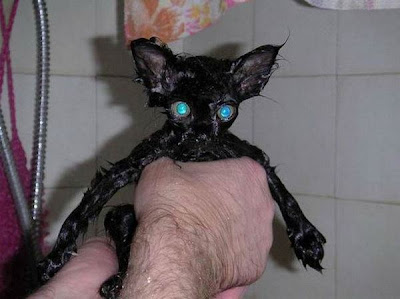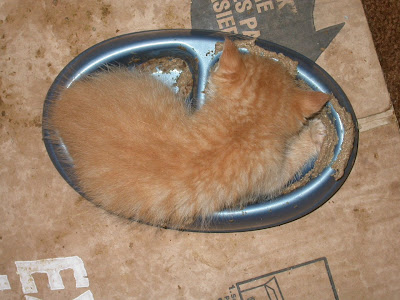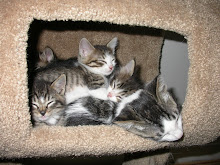Here is an easy way to help dogs . . . sign the petition "Stop Puppy Mills - Five Things You Can Do". The ASPCA is asking you to sign this petition to help them reach the goal of 25,000 signatures. We at the HUmane Society for West Texas, care deeply about this cause, and we hope you will support the ASPCA efforts.
Monday, May 25, 2009
Thursday, May 14, 2009
A few thoughts on cat baths...by The Cat:

'But You Said You Loved Me!'

'You will pay, as God is my witness, you will pay.'

'Jesus, you call this water warm???'

'I don't think I like you anymore.'

'You Lied !!!!!!'

'E.T. Phone home......quick!'

'No, I'm not your Good Little Kitty anymore.'

'Traction....I'm losing Traction!'

'I want my Mommmmmmyyyyyyyyyyyyyy!'

'No, no, no, no.....NOOOO!!!!'
Sunday, May 10, 2009
FIV: Feline Immunodeficiency Virus
Here is an article about FIV from this website
FIV is one of the fairly common cat viruses, that is much misunderstood....
We have a number of FIV cats in our sanctuary, some of which have been with us for several years and are, in general terms, both healthy and happy and living a full (but protected) life.
We know that FIV is a much misunderstood virus, which leads to many otherwise healthy cats being euthanased - in our view, unneccessarily.
The FIV virus reduces a cat's immune system, slowly (over several years) this can leave it more vulnerable to other feline infections,
that is all - in itself FIV is not life threatening.
FIV CANNOT be transmitted to humans
What is often misunderstood, is that a cat with FIV will usually have a strong immune system for several years after infection, it is only with time, that the effects of the virus may start to show, and even then, most infections can be handled by appropriate medications.
The FIV cats that do suffer, are those that are long-term strays, who have survived on a poor diet
.
and probably been involved in fights, with subsequent injuries going untreated - this is the scenario that leads to the suffering that is wrongly thought to be common to all FIVs.
In our experience, FIV positive cats can have, and deserve to have, a long and healthy life. They need careful attention to their general health and diet, but this is no more than any cat should receive. A properly cared for FIV cat need not have a shortened life expectancy. The effectiveness of all cats' immune systems reduce with age. Not many would recommend euthanasia just because a cat is getting elderly, so why so with FIV?
The main problem is that the virus can be transmitted to other cats (only cats - no other species). In the vast majority of cases, it is transmitted through biting. Cats fight for three main reasons: food, territory and mating. By providing a regular food supply and neutering, the need to fight is dramatically reduced, making the transmission of FIV far less likely. We believe that euthanasia of FIV cats is a vast over reaction.
There are many unidentified FIV cats everywhere, and most cats will come in contact with ones carrying the virus at some point, but, without fighting, there is no reason for them to become infected.
Eradicating the virus is not currently a realistic objective; and, putting to sleep a few individuals, identified with the virus but otherwise healthy, seems to us to be a futile reaction.
Correcting some of the basic misconceptions about FIV:
1 FIV is not in itself a life-threatening disease
2 FIV is not 'Cataids'
3 FIV does not necessarily shorten life expectancy.
4 FIV cannot be transferred to other species (animal or human)
FIV is a virus that affects the cat's immune system, it acts very slowly, and it is often several years before the cat shows any signs of a damaged immune system, - many never suffer at all!
FIV can make a cat more susceptible to other infections, which means they need care and protection.
It is like when humans are 'one degree under'. When 'run-down' we tend to pick up colds and suffer from minor sores, mouth ulcers etc, more so than when in top condition. It can be the same with FIV cats if they are not cared for.
In any animal (and human), their immune response varies in effectiveness from time to time depending on their general health. When we get run-down what do we do? - We take a tonic, get more sleep, have better food, take a holiday, we then regain our strength. The same is true of FIV positive cats - with good care, good food, and security, and preventing stressful circumstances, they seem to recover from most secondary infections just like non-FIV cats.
The FIV cats that have problems are the strays who have no-one looking after them - these can fall prey to all the other infections around, usually brought about through fighting for food, territory or females, and without treatment, these can escallate. It is mostly the un-neutered toms that fight, and therefore pick up and spread the virus. When one of these gets captured and taken to a vet, suffering from all manner of secondary infections, it is often too late. These cats are the ones that have led to the undeserved fear about FIV. It is the nature of a vet's work, that they will see many more ill cats than healthy ones, whereas in fact, there are very many more healthy FIV cats than ill ones - they just don't need to see the vet! - take a look at the photos of the FIV cats in our sanctuary (on the sanctuary page) and decide for yourself whether they look healthy or not - most have no need to see a vet from one end of the year to another.
Visitors to our sanctuary often express surprise "We expected to see loads of ill cats, but they all look so happy and healthy!" - Yes, that's because they are!
FIV is not the terrible thing it is made out to be, it is no more than a weakness!
This is Patrick.
Patrick came to us in 1999 in a poor state, very thin and with little fur on his back

Patrick on arrival
Patrick needed nothing more than good general care; he soon recovered and turned into a truly remarkable cat

Patrick the following year
NICK
Nick was diagnosed as FIV at one of the national 'rescue' organisations. As he was also very frightened, and in a generally poor state, he was destined to be put to sleep - until we were told about him, and he came to us

Nick on arrival in 2004
Nick, like Patrick, needed nothing more than basic good care - no special medications or suppliments, just good, regular food, and general care.

Nick in Feb 2007
Friday, May 8, 2009
The Story of Jasmine





Wednesday, May 6, 2009
Brothers B



Monday, May 4, 2009
Chewy and Savannah

Sunday, May 3, 2009
Sexiest / Manliest Dog Photo Contest! Win $50!
Viking Kitties
Saturday, May 2, 2009
Friday, May 1, 2009
Meet more of our Volunteers


















